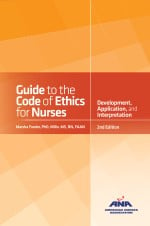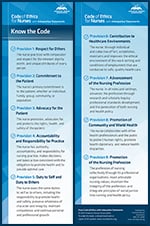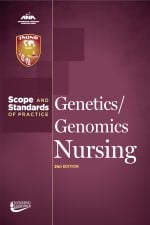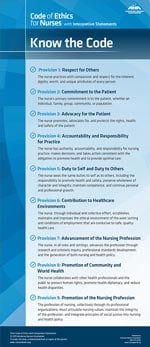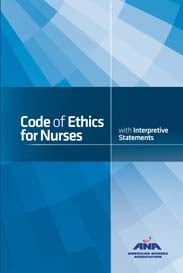Genetics and Personalized Medicine
One of the most exciting fields of modern health care development, advances in genetics and genomics offer significant potential to benefit both patients and those providing health care services. New techniques are improving options around screening, diagnosis, treatment, pharmacogenomics, and general lifestyle advice; and have the potential to affect the work of every practicing nurse in the U.S.
Patients now expect nurses to have an understanding of the care issues around genetics; while the ethical dimension is of paramount concern for nurses, who now have to take into account the ethical challenges around offering these new treatments. At the American Nurses Association (ANA), we are determined to help equip nurses with the tools they need to deal with these challenges, both in terms of educating on the specifics of new treatments, and helping promote a better understanding of the ethical issues surrounding them.
Setting the standard
With that in mind, in 2005 we partnered with the National Cancer Institute ,the National Human Genome Research Institute, and the Office of Rare Diseases of the National Institutes of Health to convene a panel of nurse leaders to identify, review, seek public comment, and publish a new framework for educating nurses on the issue. The panel’s efforts produced The Essential Nursing Competencies and Curricula Guidelines for Genetics and Genomics, which established the minimum basis for preparing the modern nursing workforce to deliver competent genetic and genomic-focused care.
Endorsed by 47 representative nursing organizations and the National Coalition of Health Professional Educators in Genetics (NCHPEG), and updated in a new edition in 2008, the document still provides the gold standard for practicing nurses when it comes to the impact of genetics and genomics.
Find out more about ESSENTIALS OF GENOMIC NURSING: COMPETENCIES
Find out more about ANA’s Center for Ethics and Human Rights
Additional resources
In such a fast-moving field, new thinking and approaches can emerge on a regular basis. To help you stay on top of developments – both in terms of practice options and ethical questions – we have collated an extensive series of resources and links to organizations related to genetics.
Ethical, Legal, and Social Issues
- The U.S. Department of Energy (DOE) and the National Institutes of Health (NIH) devoted 3% to 5% of their annual Human Genome Project (HGP) budgets toward studying the ethical, legal, and social issues (ELSI) surrounding availability of genetic information. This represents the world's largest bioethics program, which has become a model for ELSI programs around the world.
- The National Human Genome Research Institute's (NHGRI) Ethical, Legal and Social Implications (ELSI) Research Program was established in 1990 as an integral part of the Human Genome Project (HGP) to foster basic and applied research on the ethical, legal and social implications of genetic and genomic research for individuals, families and communities. The ELSI Research Program funds and manages studies, and supports workshops, research consortia and policy conferences related to these topics.
- The Human Genome Project & ELSI (Ethical, Legal and Social Implications in Genetics) A program designed to address the ethical, legal and social implications of human genetics research. www.nhgri.nih.gov
National Coalition for Health Professional Education in Genetics (NCHPEG)
NCHPEG is an "organization of organizations" committed to a national effort to promote health professional education and access to information about advances in human genetics. NCHPEG members are an interdisciplinary group of leaders from more than 50 diverse health professional organizations, consumer and volunteer groups, government agencies, private industry, managed care organizations, and genetics professional societies. By bringing together these diverse groups to focus on the educational needs of health care professionals, NCHPEG is able to draw on the collective experience and expertise to promote genetics education in a variety of ways.
NCHPEG's mission is to promote health professional education and access to information about advances in human genetics to improve the health care of the nation. NCHPEG seeks to fulfill this mission by:
- integrating genetics content into the knowledge base of health professionals and students of the health professions,
- developing educational tools and information resources to facilitate the integration of genetics into health professional practice, and
- strengthening and expanding the Coalition's interdisciplinary community of organizations and individuals committed to coordinated genetics education for health professionals.
International Society for Nurses in Genetics (ISONG)
ISONG is a global nursing specialty organization dedicated to fostering the scientific and professional growth of nurses in human genetics and genomics worldwide. The ISONG vision is: caring for people’s genetic and genomic health. To foster the scientific, professional, and personal development of members in the management of genomic information.
The ISONG Goals:
- Provide a forum for education and support for nurses providing genetic healthcare
- Promote the integration of the nursing process into the delivery of genetic healthcare services
- Encourage the incorporation of the principles of human genetics into all levels of nursing education
- Promote the development of standards of practice for nurses in human genetics
- Advance nursing research in human genetics
- Provide a forum for dialogue with others
Genomic Education Resources
Centers for Disease Control and Prevention
Genomics and Precision Health
Genomics and Precision Health Weekly Update
National Cancer Institute
NCI PDQ® Cancer Genetics Information Summaries
The Genetics of Cancer
NCI Cancer Genetic Services Directory
Biomarker Testing for Cancer Treatment
Genetic Testing for Inherited Cancer Susceptibility Syndromes
NCI Dictionary of Genetic Terms
National Human Genome Research Institute
Family Health History for Healthcare Professionals
Global Genetics and Genomics Community
Healthcare Provider Genomic Education Resource
Inter-Society Coordinating Committee for Practitioner Education in Genomics
Talking Glossary
Books
- Genetics/Genomics Scope and Standards Current Edition
- Genetics/Genomics Scope and Standards First Edition
- Essential Genetic and Genomic Competencies for Nurses With Graduate Degrees
Released in March 2012 by ANA in partnership with the International Society Of Nurses in Genetics, this publication built on much of the work contained in the Essentials of Genetic and Genomic Nursing: Competencies, Curricula Guidelines and Outcome Indicators (2nd Edition).
Health care organizations with an interest in genetics and genomics
- The U.S. Department of Energy (DOE) and the National Institutes of Health (NIH).
Devoted 3% to 5% of their annual Human Genome Project (HGP) budgets toward studying the ethical, legal, and social issues (ELSI) surrounding availability of genetic information. This represents the world's largest bioethics program, which has become a model for ELSI programs around the world.
- The National Human Genome Research Institute
Established in 1990 as an integral part of the Human Genome Project (HGP) to foster basic and applied research on the ethical, legal, and social implications of genetic and genomic research for individuals, families, and communities.
- International Society for Nurses in Genetics (ISONG)
A global nursing specialty organization dedicated to fostering the scientific and professional growth of nurses in human genetics and genomics worldwide.
- Centers for Disease Control (CDC) - Office of Genetics and Disease Prevention
The branch of the CDC that provides public health professionals with current information on human genetic research and gene discoveries.
Essentials of Genetic and Genomic Nursing: Competencies, Curricula Guidelines, and Outcome Indicators, 2nd Edition
In 2005, ANA partnered with the National Human Genome Research Institute, the National Cancer Institute, and the Office of Rare Diseases of the National Institutes of Health to host a consensus panel of nurse leaders to identify, review, seek public comment and publish essential genetic and genomic competencies for all registered nurses. The document was based on the review of earlier peer-reviewed published work reporting practice-based genetic and genomic competencies, guidelines, and recommendations. The resulting publication, The Essential Nursing Competencies and Curricula Guidelines for Genetics and Genomics was endorsed by 47 representative nursing organizations and in January 2007 by the National Coalition of Health Professional Educators in Genetics (NCHPEG) .
In 2009, Essentials of Genetic and Genomic Nursing: Competencies, Curricula Guidelines, and Outcome Indicators, 2nd Edition was published (See Below). This updated edition succinctly addresses and articulates the competencies essential for all nursing practice, as well as the subsequent curricular guidelines for all nursing education. The outcome indicators are an adjunct to the essential nursing competencies and curricula guidelines for genetics and genomics and are intended to define for each competency the knowledge and practice indicators. Developed by an independent panel of nurse leaders from clinical, research, and academic settings, this monograph reflects their goal: to establish the minimum basis for preparing the nursing workforce to deliver competent genetic and genomic-focused nursing care. To supplement its primary content, it also includes a comprehensive selection of resources that pertain directly to the competencies and guidelines. As a result, Essentials of Genetic and Genomic Nursing: Competencies, Curricula Guidelines, and Outcome Indicators, 2nd Edition, proves to be an essential resource for nursing professional development at all levels.
Personalized Medicine
Advances in genetics and genomics are being translated into practice every day. Examples include screening, diagnosis, treatment, pharmacogenomics and lifestyle choices. An understanding of the ethical challenges encountered by those receiving genetic and genomic-based health care is an essential competency for all nurses. Look here for resources that address current and emerging topics in the expanding use of genomics, cutting-edge research, and developments in policy.
Publications and ongoing online resources
- American Nurse Today:
Nursing leaders hold the key to translating genomics into practice
- A Method for Introducing A New Competency (MINC) Genomics
Published by NCHPEG, this website provides resources for nursing leaders at all levels of genomics competency, ranging from basic knowledge about genomics to its practical impact on health care systems and policies.
- The Hastings Center: Ethics and Human Research
Published on a bi-monthly basis, this peer-reviewed journal features scholarly articles and columns on genetics-related subjects.
- G2C2 website
G2C2 is a website that provides high quality educational resources for group instruction or self-directed learning in genetics/genomics by health care educators and practitioners.
- Global Genetics and Genomics Community (G3C) website
A bilingual collection of unfolding case studies for use with students and practicing healthcare providers that helps learners understand basic genetic/genomic concepts and their application to practice.
- Addressing the ethical challenges in genetic testing and sequencing of children
A 2015 report from the Clinical Sequencing Exploratory Research Consortium’s Pediatrics Working Group into predictive genetic testing of children.
